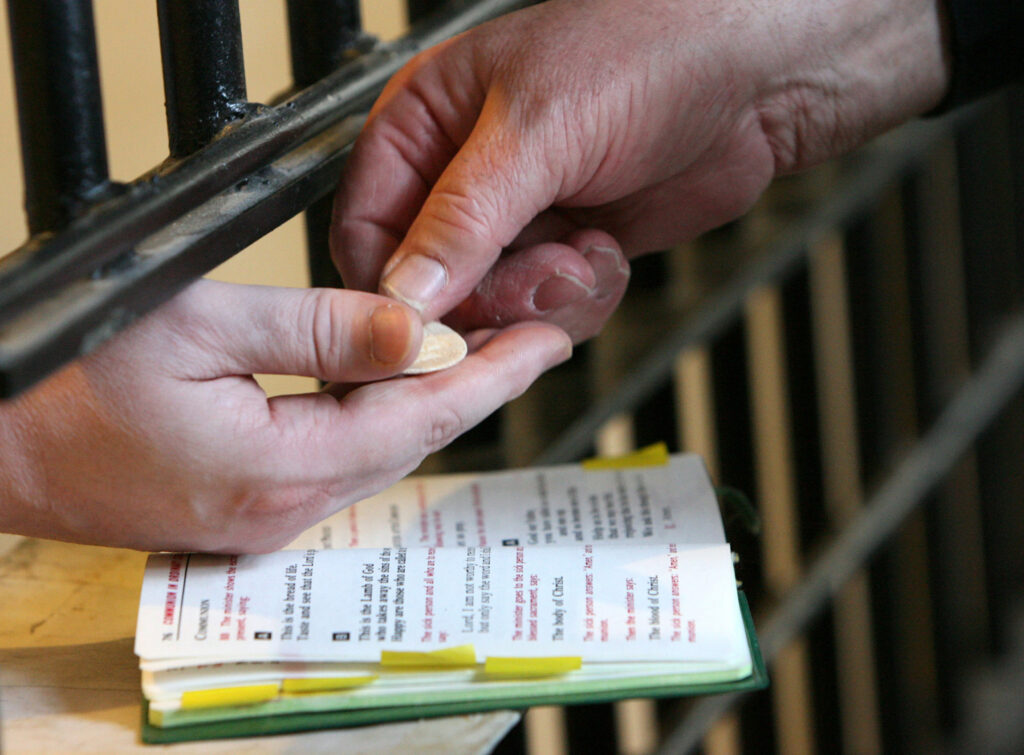Father Herb Weber, Catholic News Service
I first met Glenn in the summer of 2000 after I had begun a weekly ministry on Ohio’s death row. In early 2006 I presided at his funeral Mass a few days after his execution.
Glenn’s story is of a good-looking star high school athlete whose life fell apart when he lost himself in drugs and violence. After two brutal killings he was arrested and given the death penalty. Of course, I did not know him at that time.
During the years in prison, often in solitary confinement, he was given hope by people who reached out to him. Eventually, he heard about Catholicism and wanted to pursue it. My immediate predecessor, Father Gary, baptized him a couple months before I met him.
For Glenn, his faith journey was almost that of a modern-day prodigal son. His was not a jailhouse religion nor a way of denying his crimes. Instead, he learned to pray, practiced living virtuously and developed a devout relationship with the Eucharist.
He also showed incredible concern for the families of his victims. Shortly before his execution he told me that he had decided what his “final words” would be. He chose not to ask the families for forgiveness, something he truly wanted, because he feared that would place a new burden on them.
Instead, he chose to emphasize his sorrow and regret, knowing that he could not undo the harm that he had caused. He could not bring back to life either of the young women whose lives he had taken. As I learned later, one victim’s brother would choose to forgive him. The others would not.
Because Glenn had not had a Catholic parish growing up, we had to search for a church near his hometown for the funeral. He recalled one time when he was on the streets that he walked into a Catholic Church and found peace there. Playing detective, I tracked down that church and asked the pastor to allow this funeral. He was nervous about it, but with the blessing of his chancery he said yes.
Just before the funeral Mass began, a news reporter stopped me in the back of church and asked for an interview. I told her that I had promised both the pastor and the family that there would be no media at the Mass.
The reporter persisted, “Then just one quick question. I’m Catholic, too, and I thought we couldn’t have funeral Masses for convicted killers.”
I looked at her and told her that her information was wrong. Then I added, “Redemption — we either believe in it or we don’t. I do believe in it.”
Repentance is tied in with redemption. It has to be. Otherwise, repentance is all based on our own efforts and designs.
As Lent begins and we hear the call to repentance, most will not picture themselves as another Glenn. Thankfully. Yet repentance is still a requirement. As important as it is, it cannot be seen in isolation; it has to be a response to the death of Jesus on the cross.
The word “redemption” comes, literally, from the term to buy back. The redemptive act of Jesus’ death on the cross is a way for God-as-man to have bought back our salvation. He is the innocent placing himself in the place of the guilty and taking on our sentence of death.
Once we accept that, then true repentance makes sense. To repent is more than people simply saying they are sorry. Many people are very good at saying they are sorry, often a lesson learned when they are quite young.
Repentance has an element of sorrow, but then also acknowledges a need to change. Repentance, in the example of Glenn, meant that he had to turn his life around.
He had to admit his sins, ask for forgiveness and then do what was necessary to atone for his sins. At the same time, he was drawn closer to the Lord and discovered a more profound faith with Jesus than he had ever imagined was possible.
All the work of repentance is simply not possible on the human side alone. Repentance is a response to redemption. Because people have been given a new beginning, repentance is always about a fuller life. Just as the death of Jesus bridged humanity with God, humans accept that they are able to walk that bridge to God when they repent.
On the morning of Glenn’s execution, he allowed the brother of one of his victims to come and see him. The guards were nervous about it. Those in charge told him he had no responsibility to do so. But Glenn and the brother talked quietly with nearly a dozen guards watching every movement. I was standing next to them at the time.
After a very heartfelt conversation, the brother left and then awaited the execution in a room apart from the rest of his family. Suddenly, he called the chaplain and asked that one more message be conveyed to Glenn. When the chaplain asked what, the brother simply said, “Please tell him I forgive him.” The chaplain told this to Glenn right before his death. Glenn cried at the news.
Father Herb Weber is founding pastor of St. John XXIII Catholic Church, Perrysburg, Ohio. His weekly podcast can be found at 23.church.

